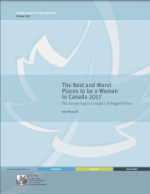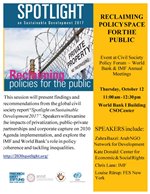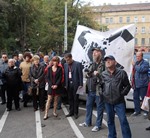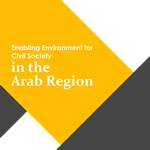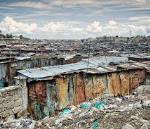Social Watch news
Published on Sun, 2017-10-22 08:24
The Cypriot government strongly supported the process of developing the post-2015 sustainable development agenda and has repeatedly expressed its commitment to the implementation of the Sustainable Development Goals (SDGs). However, it has yet to adopt a comprehensive policy framework for implementation of the goals in the national context, concludes the independent report contributed by the Center for the Advancement of Research & Development (CARDET), a member of the global Social Watch network. This report discusses the progress made towards a national strategic framework for the implementation of the SDGs and identifies the steps taken, the challenges and opportunities as well as the issue of budgeting. As Cyprus is a divided country looking for reunification, the SDGs could act as catalyst during the implementation of a solution to the national problem.
|
Published on Thu, 2017-10-19 16:41
Yesterday, Canadian Centre for Policy Alternatives (CCPA) released their ranking of the best and worst cities to be a woman in Canada. The report, by CCPA senior researcher Kate McInturff, is now in its fourth year and provides an important snapshot of the discrimination faced by women across the country—underemployment, a persistent wage gap, and life-threatening barriers when it comes to health, personal security, and more.
It is also a wake-up call—a reminder that in the absence of meaningful government intervention, Canada’s gender gap has persisted.
|
Published on Thu, 2017-10-12 00:00
This session will present findings and recommendations from the global civil society report "Spotlight on Sustainable Development 2017" at the Civil Society Forum at the Annual Meetings of IMF and World Bank.
Speakers will examine the impacts of privatization, public-private partnerships and corporate capture on 2030 Agenda implementation, and explore the IMF and World Bank's role in policy coherence and tackling inequalities.
At the event, contributors will present and discuss key findings and recommendations of this year’s report.
|
Published on Wed, 2017-10-11 13:30
Roberto Bissio (coordinator of Social Watch) said that it is vital that NGOs play a watchdog role on the SDGs and this is even more important because the official assessment, evaluation and review of the SDGs is very week, currently the reporting process is voluntary and there is no assessment of the reports that governments submit. For example in the human rights framework with the Universal Periodic Review, what governments say is really scrutinize and recommendations are formulated officially as to what governments should do. This is not the case on the SDGs, not yet at least, and that is why precisely the watchdog, looking at what governments report and what governments plan with a critical view and pushing the agenda forward making sure that the promises are met is an important rol for NGOs.
|
Published on Tue, 2017-10-10 00:00
Hungarian civil groups headed by the Hungarian United Left (MEBAL) called for a demonstration for 10 a.m. on 8th October 2017 in the heart of the previous Jewish ghetto of Budapest (i. e. on Klauzal Square, where 3 thousand killed Jews were piled up in 1944) in order to protest against the presently very powerful autocracy of the right-wing ruling power of FIDESZ and KDNP and the brutal police violence committed against Attila Vajnai, President of the European Left Workers Party 2006.
|
Published on Mon, 2017-10-09 12:47
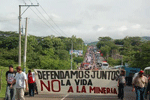
Demonstration against mining.
(Photo: Upside Down World)
|
El Salvador is the first country in Latin America and perhaps in the world to strictly prohibit all exploration and exploitation of underground metals, as well as open-pit mining. The Social Watch coalition of El Salvador welcomes this decision as “a triumph of the struggle carried out by different social organizations, which now have this legal tool to defend the environment and the lives affected”. However, they remind that “there has historically been a vacuum in the effective implementation of laws and agreements that guarantee the protection of the environment and vulnerable areas, mainly because of the lack of citizen participation in monitoring and implementing the laws”. They also demand with urgency a “comprehensive fiscal reform to effectively combat tax evasion and avoidance, thus guaranteeing needed revenues for implementing the SDGs”.
|
Published on Mon, 2017-10-09 12:45
The government of Bangladesh has announced an inclusive approach to development so that the poorest and the most vulnerable populations can be integrated into its national development efforts. This "whole society approach" requires the engagement of all stakeholders in the process. Civil society organizations envisage a strengthening of democratic institutions and participatory governance to achieve the SDGs in Bangladesh, with participation of civil society in all levels of implementation, from the national to the grassroots level.
They therefore demand that "IFIs and the WTO must respect policy spaces for LDCs and developing countries so that national sovereignty in decision-making and the very nature of the State in respect to welfare and redistributive justice can be protected".
|
Published on Wed, 2017-09-27 15:09
The Arab NGO Network for Development (ANND) launched a book on the enabling environment of civil society in the Arab region. The publication aims to present an overview of the current situation of civil society organizations in Tunisia, Egypt, Lebanon, Iraq, Syria, and Palestine. It uses several country-specific indicators regarding the establishment of civil society organizations and their success. The current conflicts raging in the Arab region constitutes a serious challenge, especially in lack of attention to laws regarding the work of civil associations, in addition to the shifts faced in funding.
The publication highlights several legal challenges, especially those resulting from the lack of commitment to the principles of the separation of powers, as applied by democratic societies, as laws and regulations are often politicized. The book includes several recommendations to invigorate the work of civil society organizations in the regional, in order to consolidate the values of justice, equality, and sustainable development.
|
Published on Thu, 2017-09-21 11:38
On 7 and 8 July 2017, the summit meeting of the G20, the group of 19 major economies and the European Union, was held in Hamburg, Germany. Media perception of the event was marked by the US President’s appearance and the conflicts in climate and trade policies. In contrast, other topics, including the G20 activities regarding the implementation of the 2030 Agenda, took a backseat. Hardly any attention was given to the Hamburg Update of the G20 Action Plan on the 2030 Agenda.
Many observers representing academia and civil society viewed the Summit resolutions as insufficient or even counterproductive. Above all, they criticized the blind faith in economic growth reflected by the Summit documents and the one-sided focus on private investments to finance development.
|
Published on Fri, 2017-09-15 14:45
The Kenya Social Watch report registers “heavy and unprecedented investment in mega-infrastructure projects.” Instead of spurring equitable economic growth these initiatives are placing on the national economy an unbearable debt burden of some US$ 50 billion.
The report states that “the growth-leading sectors have not only been broadly based but also have performed poorly, particularly in respect to poverty-reduction and equity-inducing policy dispensations and accompanying strategic instruments. Decreased activity in the agricultural and manufacturing sectors have induced a jobless growth that has had the effect of a flood in the wake of which not all the boats could be lifted. Instead it has rendered Kenya one of the most unequal societies in the world.”
|
SUSCRIBE TO OUR NEWSLETTER
Submit

|


